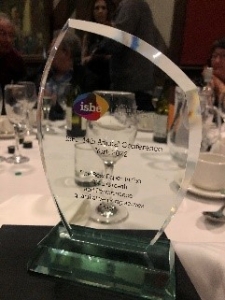ERC @ ISBE 2022
Several members of the ERC team took part in the Institute for Small Business and Entrepreneurship (ISBE) conference in York on 27th and 28th October. The conference theme this year was ‘New Approaches to Raising Entrepreneurial Opportunity: Reshaping Inclusive Enterprise, Policy and Practice Post-Pandemic’.
ERC staff presented papers on a range of themes including innovation in rural firms, business resilience and risk planning, the net zero and digital transition, managing mental health and social capital and entrepreneurship. Three papers from the ERC were awarded best paper awards at the event. A full list of the papers presented can be found below.
Professor Stephen Roper (ERC Director) and Professor Mark Hart (ERC Deputy Director) were also included in the five ISBE Fellowship awards for 2022. The ISBE Fellowship recognises ‘significant contribution to the research landscape in small business and entrepreneurship, and a continued engagement with policymakers and business owners alike’.
The other three other fellowships were awarded to Professor Kiran Trehan, Pro-Vice-Chancellor Partnership and Engagement, University of York; Professor Maggie O’Carroll, CEO of The Women’s Organisation and visiting Professor at the University of Liverpool and Hunter Centre, University of Strathclyde; and Professor Simon Bridge, Emeritus Professor Ulster University.
ERC papers presented at ISBE 2022
Compensation and exploitation behaviours in the innovation strategies of rural firms: Econometric evidence for the UK – Best paper – Networks, Innovation and Policy track
Serdal Ozusaglam, Stephen Roper
Abstract: Urban environments have typically been thought to provide better support for innovation due to their higher levels of knowledge sharing and potential learning. Firms in rural environments may instead be disadvantaged by less dense local networks and fewer regional collaboration opportunities. Recent case study evidence has, however, suggested the potential for compensation and exploitation strategies by rural innovators. Firms may compensate for the weakness of localised knowledge spillovers in rural areas by developing more extensive formal collaborations with distant firms. Firms in rural areas, where there is less chance of knowledge leakage, may be able to exploit this advantage by reducing their investment in formal IP protection. We test the significance of these effects for a large sample of innovation active rural firms and product innovators in the UK.
What Crisis? Business Resilience and Risk Planning in Rural SMEs in Three English Regions – Best paper -Rural Enterprise track
Maria Wishart, Kevin Mole
This paper examines the link between rural SMEs’ strategic planning activities and their likelihood to engage in resilience planning. Research has found that rural firms are significantly less likely to undertake general business planning than their urban counterparts (NICRE 2022). Understanding whether rural firms also approach resilience planning differently will extend our understanding of rural enterprise, to inform policy and practice in this area. We estimate the likelihood that the businesses are unlikely to plan for adversity which has consequences for resilience and business survival. The aim of the research was to understand the firm-level and location-related factors that impact the degree of resilience planning undertaken by rural SMEs.
Twin Net zero and Digital transition – myth or reality? Evidence from UK SMEs – Best Paper – SME Growth and Performance: quantitative perspectives track
Effie Kesidou, Stephen Roper, Anastasia Ri
Twin net zero and digital transition is believed to be an important pathway to sustainable recovery and growth. It is also likely to have substantial implications for productivity. However, little is known about how these two transition processes relate to each other and how organisations may leverage digital technologies and capabilities to innovate for environmental sustainability, especially in the context of SMEs. Here, based on the analysis of the novel survey data of around 1,000 businesses representative of the UK SMEs population conducted in 2020, we ask: Does digital diffusion facilitate the diffusion of net zero innovations? More specifically, through the lens of Diffusion of Innovation (DoI) theory, we explore how stages of digital adoption relate to stages of adoption of net zero technologies and organisational practices
Resilience in small business leaders and the link to resilience planning in their firms
Maria Wishart, Halima Jibril, Stephen Roper
In this paper, we consider the links between the psychological resilience of entrepreneurs and the resilience of the firms they lead. We consider whether high levels of entrepreneurial psychological resilience are linked to firms’ adoption of business resilience planning. We also explore whether the effect of psychological resilience may differ for entrepreneurs based in deprived areas.
Emotion work as a coping strategy for line managers dealing with employee mental health issues
Maria Wishart
Many employers rely on untrained managers to deal with mental health issues in their employees. This research adopts an emotion work lens to examine line managers’ accounts of workplace mental health issues, to explore the ways in which these individuals experience, and cope with, the management of mental health issues in their staff. In examining the experiences of line managers dealing with workplace mental health issues, this paper offers insight into inclusion in the workplace for the employees experiencing these issues.
Local Social Capital and Necessity Entrepreneurship
Tomasz Mickiewicz, Anastasia Ri, Neha Prashar, Mark Hart
In this paper, we posit that robust social capital, by fostering exchanges between people, mutual support, and collaboration, provides the basis for entrepreneurship: social linkages at the local level are appropriable for business purposes, and spur entrepreneurial activity. Moreover, we argue that the local social capital has a particularly important impact on necessity entrepreneurs, i.e. entrepreneurs who would otherwise not be economically active, facing bleak employment prospects elsewhere. This is consistent with the literature that emphasises the positive effect of social capital on marginalised communities. We argue therefore that by enhancing necessity entrepreneurship, the social capital may create positive economic effects for the local community.
Digitalisation and SMEs’ Environmental Performance: New empirical evidence on the direct and indirect effects of digital technologies
Effie Kesidou, Anastasia Ri, Hoang M. Luong
The Covid-19 pandemic has forced SMEs to accelerate their digital transformation, in order to maintain their business operations amidst social distancing and other related regulations. We believe that this acceleration of SMEs’ digitalisation might also play a role in their environmental performance, either directly, or through indirect effect by supporting and strengthening the effectiveness of different Net Zero practices. In this paper, we present some empirical evidence on these effects of digitalisation. We believe the knowledge of these different channels in which digital technologies could affect firms’ environmental performance is crucial for both firm management and policy implications, in order to achieve the Net Zero target in 2050.
You can find out more about the event and the other papers presented here














